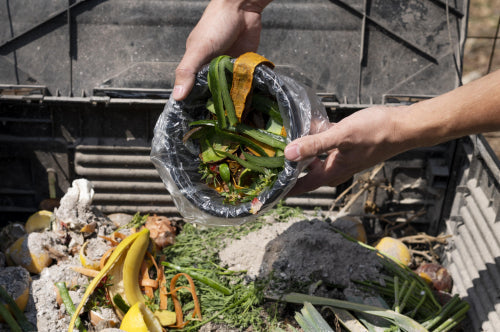Quick Listen:
Sustainability has become a central focus in many aspects of daily life. Gardening, a practice that has long been linked to nature and the earth, is no exception. One of the simplest yet most impactful ways to contribute to both the environment and your garden is by recycling waste materials into valuable fertilizers. By repurposing kitchen scraps, yard trimmings, and other organic waste, gardeners can create nutrient-rich compost and organic fertilizers that enhance soil health, reduce the need for chemical fertilizers, and minimize waste. In this article, we'll explore how recycling in gardening can turn waste into fertilizer and how this sustainable practice can transform your garden into a thriving, eco-friendly space.
The Benefits of Recycling in Gardening
Before diving into the process, let's first take a look at the numerous benefits of using recycled materials in gardening:
Sustainability: Recycling waste materials in your garden reduces the overall carbon footprint by minimizing the need for synthetic fertilizers, which require significant resources to manufacture. This simple change can contribute to lowering greenhouse gas emissions.
Waste Reduction: By turning kitchen scraps and yard trimmings into compost or fertilizers, you divert waste from landfills, significantly reducing the amount of organic waste that ends up as landfill waste. This helps reduce the strain on waste management systems.
Soil Health: Organic matter is essential for healthy soil. Recycled compost and homemade fertilizers improve soil structure, enhance moisture retention, and boost beneficial microbial activity in the soil. Healthy soil supports strong plant growth and reduces the need for chemical fertilizers, which can harm the environment.
Cost-Efficiency: Purchasing fertilizers and compost can be expensive, especially for larger gardens. By creating your own organic fertilizers from waste materials, you can cut down on gardening costs and enjoy the satisfaction of knowing your garden is thriving with minimal expense.
Reduced Chemical Exposure: Chemical fertilizers can sometimes harm plants, soil organisms, and even local water sources due to runoff. Using organic fertilizers made from recycled waste is a safer, natural alternative that nourishes your plants without the risk of pollution.
How Recycling in Gardening Works
Recycling in gardening primarily revolves around composting and creating organic fertilizers from organic waste. Let's break down the process and the types of materials you can use:
1. Composting Kitchen Scraps
Composting is the process of breaking down organic materials into nutrient-rich humus, which can be used to improve soil quality. Kitchen scraps are one of the easiest and most effective waste materials to recycle into compost. Some common kitchen waste items that can be composted include:
- Fruit and vegetable scraps: Peels, cores, and leftover bits from your meals are packed with nutrients that can benefit your garden. Avoid composting citrus peels in large quantities, as they can slow down the decomposition process.
- Coffee grounds: Coffee grounds add nitrogen to the compost, which is crucial for the growth of plants.
- Eggshells: Crushed eggshells add calcium to the soil, which is beneficial for preventing blossom end rot in tomatoes and peppers.
- Tea bags: Most tea bags are compostable, but be sure to check that they are free from synthetic materials like plastic.
2. Composting Yard Trimmings
Yard waste like grass clippings, leaves, and small twigs are perfect for composting. However, it's important to balance the carbon-to-nitrogen ratio in your compost pile. Yard waste tends to be high in carbon, so it's important to combine it with nitrogen-rich kitchen scraps for optimal decomposition. Here are some yard waste materials to recycle:
- Grass clippings: These provide nitrogen to the compost, helping to accelerate decomposition. If you have too many clippings, use them sparingly to avoid creating a soggy pile.
- Autumn leaves: Fallen leaves are an excellent source of carbon. They break down over time, adding valuable organic matter to your compost.
- Small twigs and branches: These add structure to the compost pile, allowing air to flow through and preventing it from becoming too compacted. Shred or chop them before composting for quicker decomposition.
3. Turning Waste into Organic Fertilizer
In addition to composting, you can create liquid fertilizers from organic waste, such as compost teas or vermicompost leachates. These liquid fertilizers are rich in nutrients and can be applied directly to the soil or used as a foliar spray. Here's how you can create your own organic fertilizers from waste:
- Compost tea: Steep your finished compost in water for 1-2 weeks, stirring it occasionally. Strain the mixture and use the liquid to water your plants. This process extracts beneficial microorganisms and nutrients from the compost, giving your plants a nutrient boost.
- Comfrey tea: Comfrey is a nutrient-dense plant that can be used to create an excellent liquid fertilizer. Simply chop fresh comfrey leaves, place them in a container, and cover with water. Allow it to steep for several weeks before using it as a liquid fertilizer.
- Vermicompost tea: Worm castings, or vermicompost, are an excellent source of nutrients for plants. Place a handful of worm castings in a fabric bag or pantyhose, and steep it in water for a few days. Use the resulting liquid to feed your plants.
4. Other Methods for Recycling Waste
Beyond composting, there are other creative ways to recycle organic waste and improve your garden's soil. For example, you can use certain waste materials as mulch or to create garden structures. Here are a few ideas:
- Mulching with cardboard or newspaper: Cardboard and newspaper can be used as a weed barrier and mulch, breaking down over time to add organic matter to the soil. Just make sure to remove any glossy or colored inks, as they may contain harmful chemicals.
- Using coffee grounds as mulch: A layer of coffee grounds can act as mulch, helping to retain moisture in the soil while also providing additional nitrogen.
Tips for Successful Recycling in Gardening
While recycling in gardening is an easy and rewarding practice, it's important to keep a few key tips in mind to ensure the best results:
Balance Carbon and Nitrogen: For effective composting, ensure you have a good mix of carbon-rich materials (such as leaves and straw) and nitrogen-rich materials (like kitchen scraps and grass clippings). The ideal ratio is roughly 30 parts carbon to 1 part nitrogen.
Maintain Aeration: Compost needs air to break down properly. Turn your compost regularly to keep it aerated and prevent it from becoming compacted.
Avoid Diseased Plants: Avoid composting plants that show signs of disease, as they may spread pathogens to your compost and contaminate the soil.
Shred Large Materials: Shredding or chopping larger organic materials, such as twigs or vegetable scraps, will speed up the composting process.
Monitor Moisture Levels: Your compost should be moist, but not too wet. If it's too dry, add water; if it's too wet, add dry materials like leaves or straw to balance it out.
Turning Waste into Fertilizer
Recycling in gardening is a win-win practice. By turning waste materials like kitchen scraps and yard trimmings into compost or organic fertilizers, you're not only contributing to a healthier garden, but also reducing your environmental impact. This sustainable approach to gardening nurtures the soil, promotes plant health, and helps reduce the need for synthetic chemicals. With a little effort and creativity, you can transform waste into a valuable resource that benefits both your garden and the planet.
By adopting these recycling methods, gardeners can actively participate in the circular economy, where nothing goes to waste, and everything has a purpose. So, next time you're preparing a meal or raking leaves, remember that these wastes could be the key to growing a more productive and eco-friendly garden. Happy recycling, and happy gardening!
You may also be interested in: Klatt Objects - stilvolles Design - DerGartenmarkt.de ...
Discover your gardening joy with a top selection. Your joy and green happiness begin here. Shop Now
Powered by flareAI.

